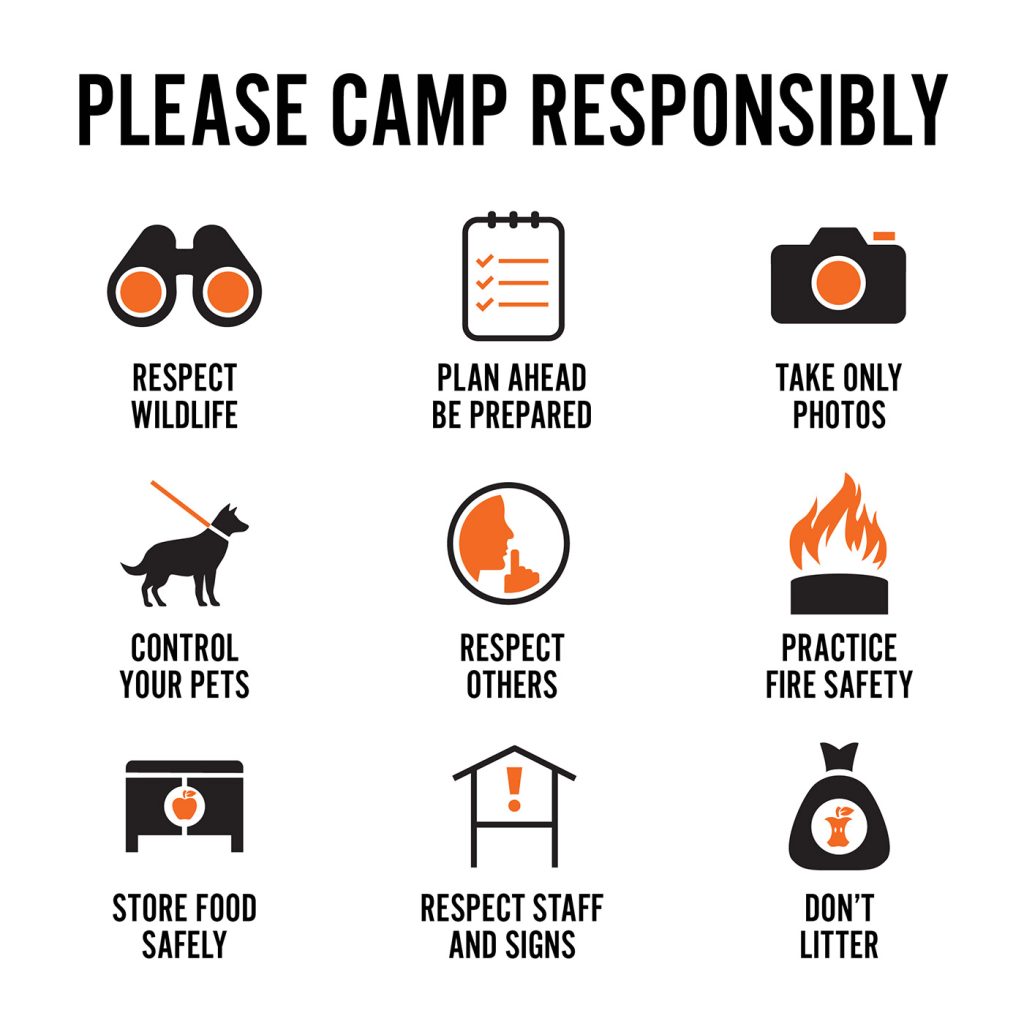The Campers’ Code
As outdoor enthusiasts increasingly venture into the wild landscapes of British Columbia, understanding and following the Campers’ Code has never been more essential. It provides a series of ethical guidelines and practical rules intended to foster respectful and sustainable behaviour while camping in BC’s great outdoors. In essence, it’s a social contract between nature, campers, and other outdoor users, aiming to protect and preserve the environment for future generations.
What is the Campers’ Code?
The Campers’ Code is a set of guidelines designed to promote responsible camping. These principles reflect a commitment to preserving the environment, respecting local communities and cultures, and ensuring the safety and enjoyment of everyone involved.
The Camper’s Code is a collaborative campaign started in 2021 by a dozen BC-based organizations who believe deeply in the responsibility of every single person to create a safe, enjoyable, respectful camping experience for all—people, wildlife, and nature, too.
You can take the pledge to camp responsibly according to the Campers’ Code. Canadian residents will receive a free sticker if they take the pledge.
Key Elements of the Campers’ Code

- Plan Ahead and Prepare: Good planning is the cornerstone of responsible camping. Check the regulations and special considerations for the area you plan to visit. Plan your trip during times of low use to reduce your impact on the environment. Prepare for extreme weather, hazards, and emergencies.
- Respect Staff and Signs: Protect vegetation and wildlife habitats by sticking to designated trails and camping on durable surfaces. Set up camp at least 60 metres from lakes and streams to protect riparian areas. Respect park staff as they are there to help protect and preserve the nature areas for everyone to enjoy.
- Don’t Litter: “Pack it in, pack it out.” This means you should take all your waste with you when you leave. Use designated waste disposal facilities where available.
- Take Only Photos: Let nature’s beauty remain for others to enjoy. Do not damage trees, sensitive eco-systems, or disturb archaeological or cultural artifacts.
- Practice Fire Safety: Check before you leave for your camping trip if a fire ban is in place. Where and when fires are permitted, use established fire rings. Keep fires small, burn only sticks from the ground that can be broken by hand and make sure to put out fires completely.
- Respect Wildlife: Observe wildlife from a distance. Never feed animals, as feeding wildlife damages their health, alters natural behaviours, and exposes them to predators and other dangers.
- Respect Others: Respect other visitors and the quality of their experience. Avoid loud noises and unruly behaviour and respect private property and boundaries.
- Control Your Pets: Not everyone is a “dog-person”. Keep your dogs on a leash and under control and make sure to pick up after them and not leave poop bags on trails or at campsites.
- Store Food Safely: Food can attract bears and other wild animals, so make sure your food is stored securely to prevent wildlife encounters and wildlife that may become attracted to human food.
By adhering to the Campers’ Code, we can ensure that the diverse, pristine environments of British Columbia remain untouched and beautiful for generations to come.
The Campers’ Code is not merely a list of rules, it’s a commitment to sustainable and ethical camping. It’s an appeal to each camper’s sense of responsibility and love for nature. By following these guidelines, campers can contribute to preserving BC’s beautiful and diverse natural landscapes for future generations.

Comments that gratuitously attack or demean individuals or organizations are not acceptable. We reserve the right to remove comments or any other content we deem unacceptable in our sole discretion, including removing user names and profile pictures. For our full website terms and conditions including our legal guidelines for user postings and comments on www.vancouvertrails.com, please see our Terms of Use and Privacy Policy.